Election workers fear trouble, boost security as vengeful threats persist after Trump loss
- Oops!Something went wrong.Please try again later.
PHILADELPHIA – Lisa Deeley was just looking for some fresh air when the local election chief, in the midst of certifying the local 2020 vote, stepped outside the downtown convention center for a simple walk that would turn her life upside down.
Unknowingly, Deeley's path took her headlong into the viewfinder of a camera-wielding Donald Trump supporter who unleashed a torrent of insults, falsely accusing the city commissioner of election fraud and demanding unauthorized access to the vote count.
The video, posted to social media, immediately went viral, prompting a wave of threats requiring the appointment of a plainclothes security detail that for weeks accompanied the commissioner everywhere she went – from the restroom to her local Wawa convenience store. The threats got so bad she relocated her mother to a New Jersey beach town to remove her from the line of fire.
Election fears:'I dread 2024': America's local election officials are being pushed to their limits
Under pressure:Election workers faced new threats after 2020 election. Experts fear it will drive them away
"Everybody who's had this position before me has worked in relative anonymity," Deeley said. "Nobody paid any attention to this position before – until 2020."
Deeley's story is not unfamiliar to legions of election workers who are now bracing for the fast-approaching midterms and increasing security concerns animated by baseless attacks on local election systems and administrators leveled by the former president and his allies.
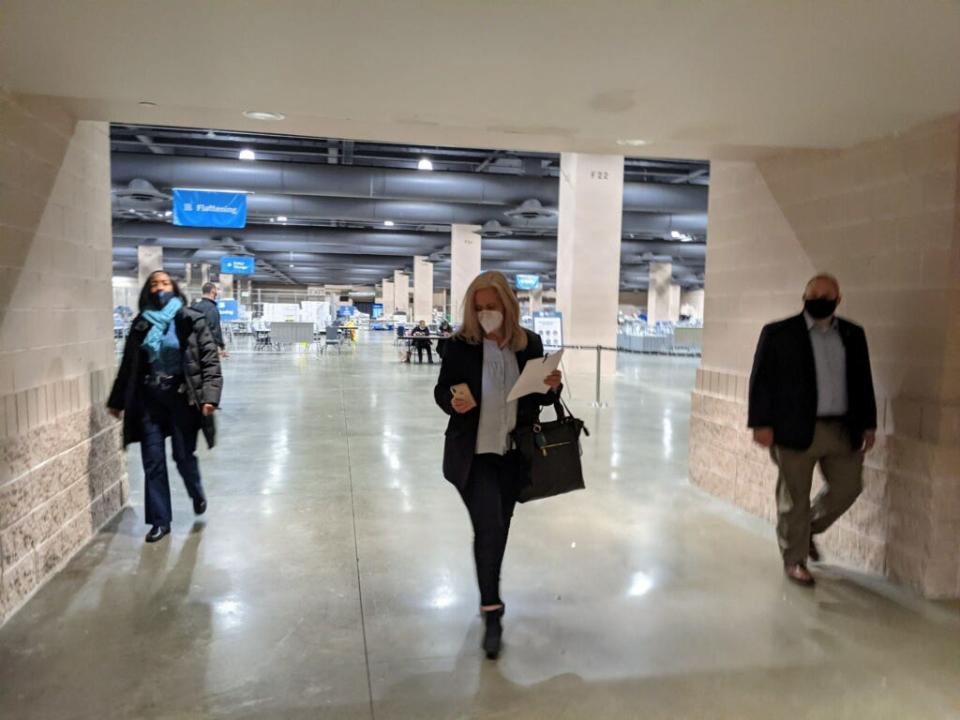
The 2020 election, in addition to igniting an extremist revolt that resulted in the stunning assault on the U.S. Capitol, has transformed a foundational civic exercise – voting – into a new national security challenge, with the 2022 vote representing the first national test of a system that faced unprecedented assault two years ago.
Local election workers, who once operated in near-political obscurity, have added protection plans to jobs that once celebrated the cycles of democratic engagement. Threats to their well-being have drawn the attention of federal authorities, while new plans are emerging for even more aggressive monitoring of polling places by partisan political operatives.
"We are trying to prepare for the worst, and hope for the best," said Karen Brinson Bell, the chief election official in North Carolina, whose preparations have recently included conflict resolution and active shooter training.
"We really did not think we would face these things," Bell said.
And there is reason for concern.
Poll watchers to swarm battleground states
As Trump has made the "big lie" a litmus test for Republican candidates in the midterms, the GOP and conservative allies are planning to swarm battleground states with thousands of "poll watchers" charged with rooting out alleged voter fraud, a mission that election officials suggest is merely code for authorizing intimidation.
Both parties have deployed poll watchers for decades, but Republicans are producing record-setting plans to monitor elections in 2022. One reason is the end of a lawsuit that had restricted their activities at polling places, and another is Trump's continuing complaints about 2020.
The Republican National Committee said its plans include more than 52,000 poll watchers and poll workers, as well as "37 in-state election integrity counsels" – lawyers willing to wage election challenges in court, if necessary. As part of the effort, the party also says it has staged more than 4,600 poll watcher trainings.
"The RNC’s stance on election integrity is that we should make it easier to vote, and harder to cheat," said an outline of the RNC plan. "Within that proposal are five core integrity issues: Voter IDs, absentee signature matching, bipartisan observers, updated voter rolls, and timely processing and counting of ballots."
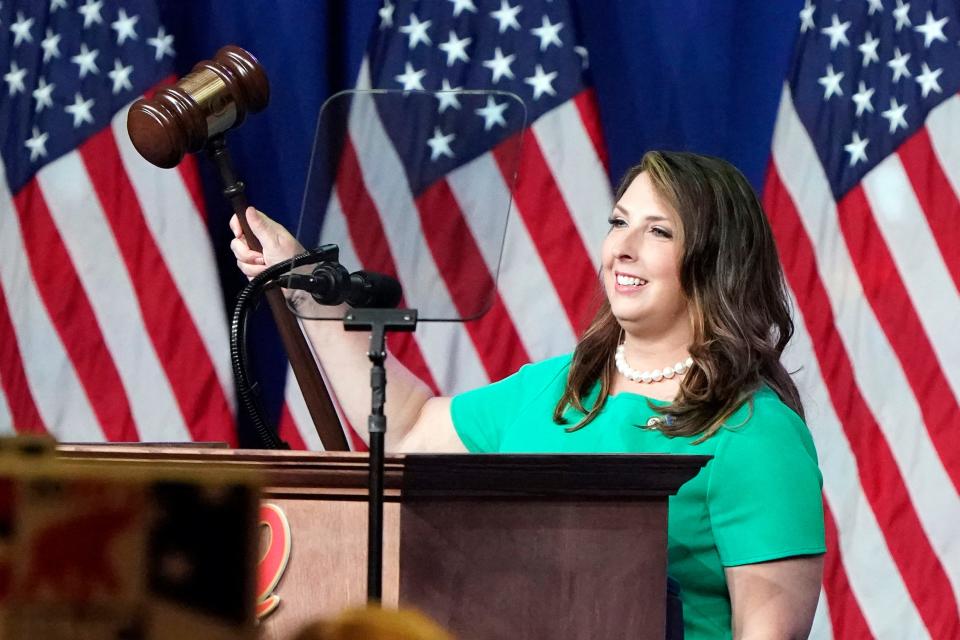
Separate from the efforts of the Republican Party, there are conservative groups who are planning to install their own poll watchers.
David Becker, executive director and founder of the nonprofit Center for Election Innovation & Research Center, said poll watchers are useful to the smooth running of elections – if they play by the rules.
"What we're talking about are people who are going outside their authority," Becker said, and may be willing to "interfere" with the process.
"Vigilance is the operative term here."
In political denial:Hundreds of elections deniers running for office nationwide in 2022 pose 'major threat' to U.S. democracy
Long-time planning:GOP to massively step up 2022 poll watching efforts in Michigan and across U.S.
The stepped-up Republican poll-watching project has been developed as Trump continues to make false claims about voter fraud in 2020, and demands that GOP candidates make it an issue in future elections.
Democrats and voting rights advocates said the campaign could only encourage overzealous Trump loyalists to engage in voter intimidation and disrupt polling places, similar to attempts in 2020.
Brendan Fischer, deputy executive director of the election watchdog organization Documented, said conservative organizations are training hyperpartisan activists to challenge voters in an effort to suppress turnout. He said many poll watchers will be election deniers who refuse to believe Trump lost to Biden two years ago.
"It isn't necessarily a problem that more Republicans or more Democrats are getting involved in the election process," he said. "The problem is that individuals who believe in baseless election conspiracies are entering the election system."
Watchdog groups are more concerned about plans by conservative organizations to post poll workers who, in some cases, may be election deniers with a grudge against the election system.
The Conservative Partnership Institute, one of whose senior partners is former Trump White House chief of staff Mark Meadows, has created what it calls an "Election Integrity Network." It is headed by Cleta Mitchell, an attorney who supported the Trump campaign's protests of 2020 election results.
Avid Trump supporter and pillow salesman Mike Lindell is also helping conservatives deploy poll watchers during the upcoming elections.
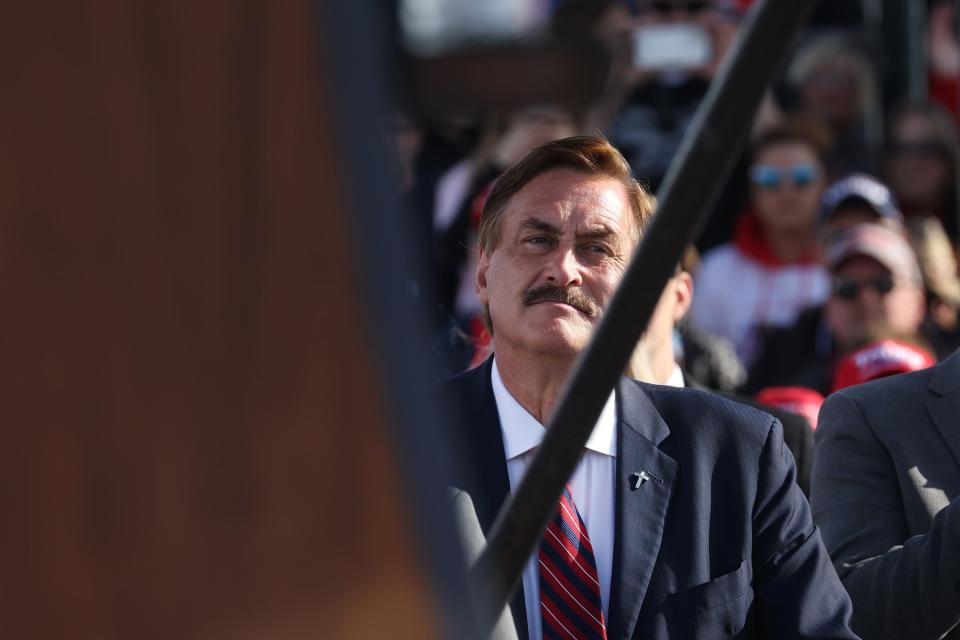
An organization dubbing itself the Michigan Grassroots Alliance announced an "Election Overwatch" program, claiming that "everyday citizens all across America have been deployed to ensure that the 2022 elections are conducted in a lawful manner."
"If you are someone who seeks to cast a vote illegally, we are watching," said the announcement from the group.
Patrick Colbeck, a former Michigan Republican state senator, said that "poll challengers, poll workers and canvassers" have also been threatened and harassed by Democrats and election officials who don't want oversight of their activities.
"Please note that the conflict is not between sour grapes Republicans and Democrats," Colbeck said in an email. "It is between those who seek lawful elections and those who seek unlawful elections."
Sowing trouble and disinformation
Wendy Weiser, who directs the Democracy Program at the Brennan Center for Justice at the New York University School of Law, said it's disturbing that actual election deniers are included in the serious business of poll watching.
Some volunteers may be there to "disrupt the process" and "sow trouble and disinformation," she said.
The expanded RNC plan will target 17 states that are considered key battlegrounds, both in the midterms and in the 2024 presidential contest.
In a statement, the RNC said its poll watching plans "are independent from any outside organization," and that volunteers are trained on "the need to comply with federal and state laws protecting voting rights." The RNC said it would dismiss any volunteer who breaks the rules.
Poll-watching targets include six states in which Trump protested Biden's victory, using lawsuits and extremist rhetoric that helped trigger the Jan. 6, 2021, attack on the U.S. Capitol: Georgia, Arizona, Nevada, Pennsylvania, Michigan and Wisconsin.
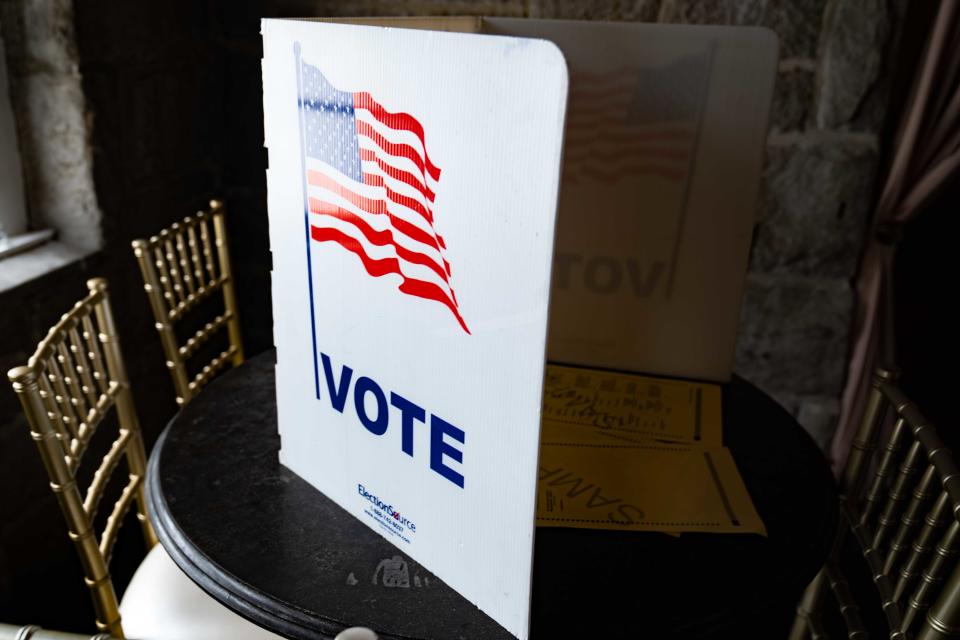
Republican Party and state affiliates have also filed lawsuits against counties in Arizona and Nevada – two swing states – over restrictions on poll workers. An RNC statement on one of those lawsuits said "Arizonans deserve basic transparency about how their elections will be conducted."
Republican poll watchers will also be busy in Florida, Texas and Ohio, states that are essential for Republicans if they want to win control of Congress or the presidency.
Most of these states are making plans to deal with the influx of poll watchers.
In North Carolina, Henderson County reported a near-tripling in the number of poll watchers during its May primary, and some had to be warned off as they got too close to voters, voting machines, and elected officials.
Karen Hebb, director of the Henderson County, North Carolina, Board of Elections, said previous elections drew eight to 10 observers from each party; between 28 and 30 Republican poll watchers appeared at polling places during the May primary.
The county government has since re-affirmed its rules to govern the conduct of poll watchers from both parties.
"We want to let them know ahead of time what we're going to allow and what we're not," Hebb said.
Justice Department beefs up election security before midterms
The wave of harassment and abuse targeting local election workers in 2020 prompted the Justice Department to launch the Election Threats Task Force, supported by the FBI's network of 56 field offices.
At the time it was created last year, Deputy Attorney General Lisa Monaco and FBI Deputy Director Paul Abbate cast the unit as a new guardian of the "electoral process."
“A threat to any election official, worker, or volunteer is a threat to democracy," Monaco said.
Since last summer, the task force has reviewed more than 1,000 reports of threatening communications. About 11% of those met the threshold for federal investigation, so far resulting in seven overall criminal prosecutions.
The bulk of the potentially criminal threats involved election workers in seven states – Arizona, Georgia, Colorado, Michigan, Pennsylvania, Nevada and Wisconsin – where the vote was close and involved post-election challenges, senior FBI officials said last week at an election-security briefing.
On Thursday, federal authorities announced charges against an Iowa man, accused of threatening a Phoenix-area election official and an official with the Arizona Attorney General's Office in telephone calls last year.
"I am glad that you are standing up for democracy and want to place your hand on the Bible and say that the election was honest and fair," Mark Rissi, 64, allegedly told the election official in a September 2021 message. "When we come to lynch your stupid lying Commie (expletive), you’ll remember that you lied on the (expletive) Bible, you piece of (expletive). You’re going to die, you piece of (expletive). We’re going to hang you. We’re going to hang you.”
In December, Rissi allegedly left a similar message in a call to the Attorney General's Office.
"Do your job ... or you will hang with those (expletive) in the end," the message stated. "We will see to it. Torches and pitchforks. That’s your future, (expletive). Do your job.”
In a separate case Thursday, a Nebraska man was sentenced to 18 months in prison for posting multiple threats on Instagram, targeting the chief elections official in Colorado.
“Your security detail is far too thin and incompetent to protect you," Travis Ford wrote in one of the posts. "This world is unpredictable these days … anything can happen to anyone.”
Attorney General Merrick Garland said the case "makes clear that those who illegally threaten election workers should be prepared to face meaningful penalties."
The protection of election workers has become a relatively new front for federal authorities who until 2020 were primarily focused on safeguarding election systems from foreign adversaries, including Russia, and blunting cyber campaigns aimed at disrupting election operations, stealing voter data and altering vote counts.
So far, the officials have identified no credible threats to U.S. voting systems in advance of the midterms. But a measure of their concern for threats to election workers was underscored during the security briefing when FBI officials from the Criminal Investigative Division outlined their security preparations.
In August, FBI Director Christopher Wray described election and politically motivated violence "almost a 365-day phenomenon," an outgrowth of the country's deep divide.
"I feel like everyday I'm getting briefed on somebody throwing a Molotov cocktail at someone for some issue," Wray told the Senate Judiciary Committee, referring to an array of array of domestic grievances, from election-related disputes to lingering anger following the Supreme Court's decision to overturn the landmark abortion-rights case Roe v. Wade. "It's crazy."
A flashpoint in Philadelphia
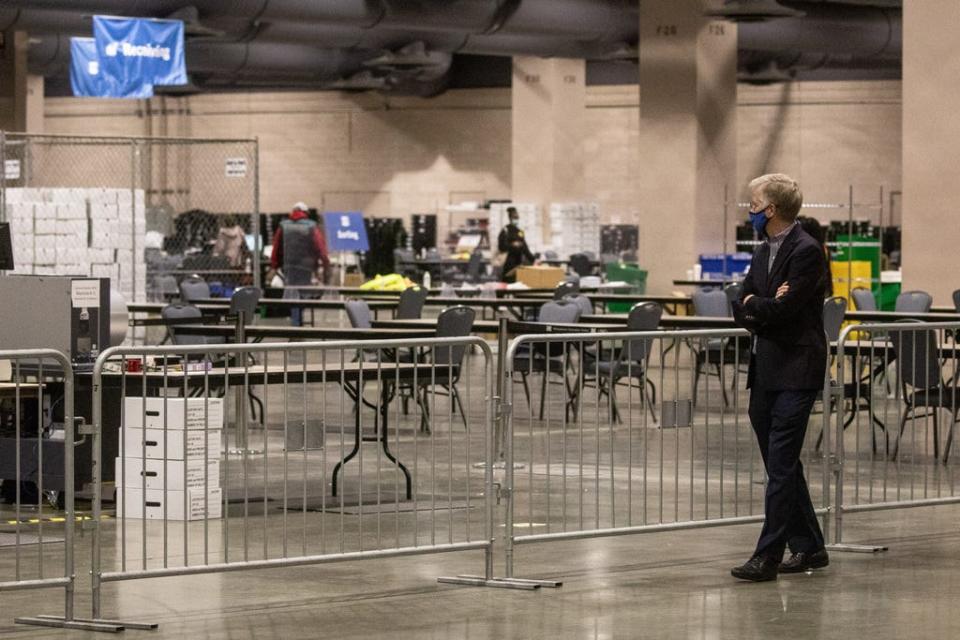
Weeks before the 2020 election, Trump took aim at Philadelphia in what would become an early front in the former president's shadow campaign to sow doubt in the final vote count.
The city, a Democratic stronghold, appeared to be a strategic choice of targets in a state Trump had narrowly won in 2016, and where any successful GOP challenge could have tipped the outcome.
On Sept. 29, 2020, in the first presidential debate in Cleveland, Trump lit a match.
Falsely asserting that poll watchers had been banned from early voting locations, Trump claimed "bad things happen in Philadelphia."
"Bad things," he continued.
Deeley, the election commissioner, said Trump's remark "popped the cork right off the bottle."
"That was it; there was no putting it back," she said, referring to the start of a campaign of threats, harassment and abuse that also did not spare her colleagues on the three-member commission, including fellow Democrat Omar Sabir and Republican Al Schmidt, who left the post last year.
In testimony before a special House committee investigating the Jan. 6, 2021, Capitol attack, Schmidt described the pressure exerted by Trump himself, who called the commissioner out by name in a Nov. 11, 2020, tweet, after Trump lost the state.
"A guy named Al Schmidt, a Philadelphia Commissioner and so-called Republican (RINO), is being used big time by the Fake News Media to explain how honest things were with respect to the Election in Philadelphia," Trump wrote. "He refuses to look at a mountain of corruption & dishonesty..."
The tweet, Schmidt told the committee, prompted a stream of graphic threats that not only targeted him, but also members of his family, with pictures of his home and address posted on social media.
Race for the Senate: Control of the Senate is now a coin flip: These are the midterm election races to watch
Race for the House:Will Republicans flip the House in midterm elections? These 12 races will tell the story.
Sabir called the 2020 vote, his first presidential election as a Philadelphia commissioner, as "baptism by fire."
"It was a lot," Sabir said, referring both to the super-charged political climate and the threat of the coronavirus pandemic.

He said the former president's disparaging comments about Philadelphia "changed the job" that now has him touring the city in an attempt to bolster confidence in the election process.
For Deeley, there also is continuing unease: just walking past the city's convention center where she was confronted two years ago makes her nauseous.
The commissioner said streets are quiet now, but the 2020 experience also is informing the city's preparations for the coming midterms.
Election officials are moving the election certification process from the center city convention center to a more obscure warehouse in northeast Philadelphia.
"I don't think it will draw the same crowds as the convention center," Deeley said.
Plans for her own personal security remain under "discussion."
"We're going to discuss with the (city's) Office of Emergency Management whether we get hotel rooms to avoid frequent travel and whether we all go to the same one," she said, adding there is also some consideration of using a "different car" to become less identifiable.
"That's crazy, right?"
This article originally appeared on USA TODAY: Midterm elections 2022: Poll workers fear trouble after Trump chaos
